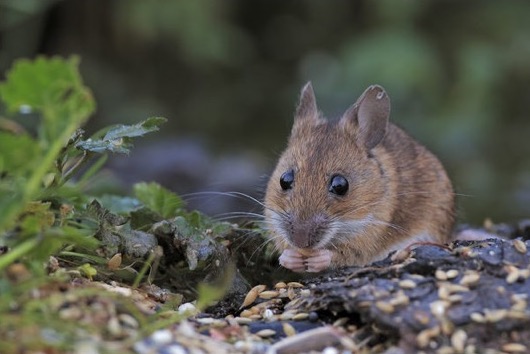I am currently offering a project on the epigenetic clock in wild mice. It is linked to our NERC-funded project: the environmental drivers of senescence: an experimental test in the wild
Supervisors: Tom Little (IEE, tom.little@ed.ac.uk), Amy Pedersen (IEE, Amy.pedersen@ed.ac.uk)
Background: Age is the single best predictor of health, including chronic diseases and our risk of dying from infections. Some individuals present an even greater risk, because they are ageing very fast, or are 'grey before their time'. But why? In humans lifestyle, reproduction and infections appear to accelerate ageing. We know much less about senescence in wild animals.
Recently, a biomarker of age has been developed that can be used on wild animals. This technology is like rings in tree trunks, but is based on the observation that molecules called methyl groups accumulate on DNA. The number of these methyl groups accurately reflects chronological age, and so this approach is termed an epigenetic clock. Importantly, individuals who are ageing rapidly have the highest methyl counts. This study aims to identify environmental factors that cause some individuals to have a fast-ticking epigenetic clock, and so are likely to die sooner.
It is helpful to study an animal on which we can do simple yet powerful experiments. That is why we study methylation in the wood mouse - an easily-captured wild mouse where we conduct controlled experiments in the field to modify key stressors. We provide high quality food or drug treat (to control parasites) half of the mice in our field locations, leaving the rest as untreated controls. To measure methylation, we will use an exciting new technology known as the multi-species methylation array that has already proven itself highly effective in other mammals. Our results will allow a better understanding of if and how nutrition and infection cause individuals to age faster or slower than expected.
Supervisors: Tom Little (IEE, tom.little@ed.ac.uk), Amy Pedersen (IEE, Amy.pedersen@ed.ac.uk)
Background: Age is the single best predictor of health, including chronic diseases and our risk of dying from infections. Some individuals present an even greater risk, because they are ageing very fast, or are 'grey before their time'. But why? In humans lifestyle, reproduction and infections appear to accelerate ageing. We know much less about senescence in wild animals.
Recently, a biomarker of age has been developed that can be used on wild animals. This technology is like rings in tree trunks, but is based on the observation that molecules called methyl groups accumulate on DNA. The number of these methyl groups accurately reflects chronological age, and so this approach is termed an epigenetic clock. Importantly, individuals who are ageing rapidly have the highest methyl counts. This study aims to identify environmental factors that cause some individuals to have a fast-ticking epigenetic clock, and so are likely to die sooner.
It is helpful to study an animal on which we can do simple yet powerful experiments. That is why we study methylation in the wood mouse - an easily-captured wild mouse where we conduct controlled experiments in the field to modify key stressors. We provide high quality food or drug treat (to control parasites) half of the mice in our field locations, leaving the rest as untreated controls. To measure methylation, we will use an exciting new technology known as the multi-species methylation array that has already proven itself highly effective in other mammals. Our results will allow a better understanding of if and how nutrition and infection cause individuals to age faster or slower than expected.
We are integrated with the following PhD programs, among others:
E4
Hosts, Pathogens and Global Health
EastBio
Best first step is to email me (1) your CV and (2) a one page statement of your research interests, with a description of research you have been involved with, and research you would like to do.
Further details of the application process are available here
E4
Hosts, Pathogens and Global Health
EastBio
Best first step is to email me (1) your CV and (2) a one page statement of your research interests, with a description of research you have been involved with, and research you would like to do.
Further details of the application process are available here

We are integrated with the following PhD programs, among others:
E4
Hosts, Pathogens and Global Health
EastBio
Best first step is to email me (1) your CV and (2) a one page statement of your research interests, with a description of research you have been involved with, and research you would like to do.
Further details of the application process are available here
E4
Hosts, Pathogens and Global Health
EastBio
Best first step is to email me (1) your CV and (2) a one page statement of your research interests, with a description of research you have been involved with, and research you would like to do.
Further details of the application process are available here